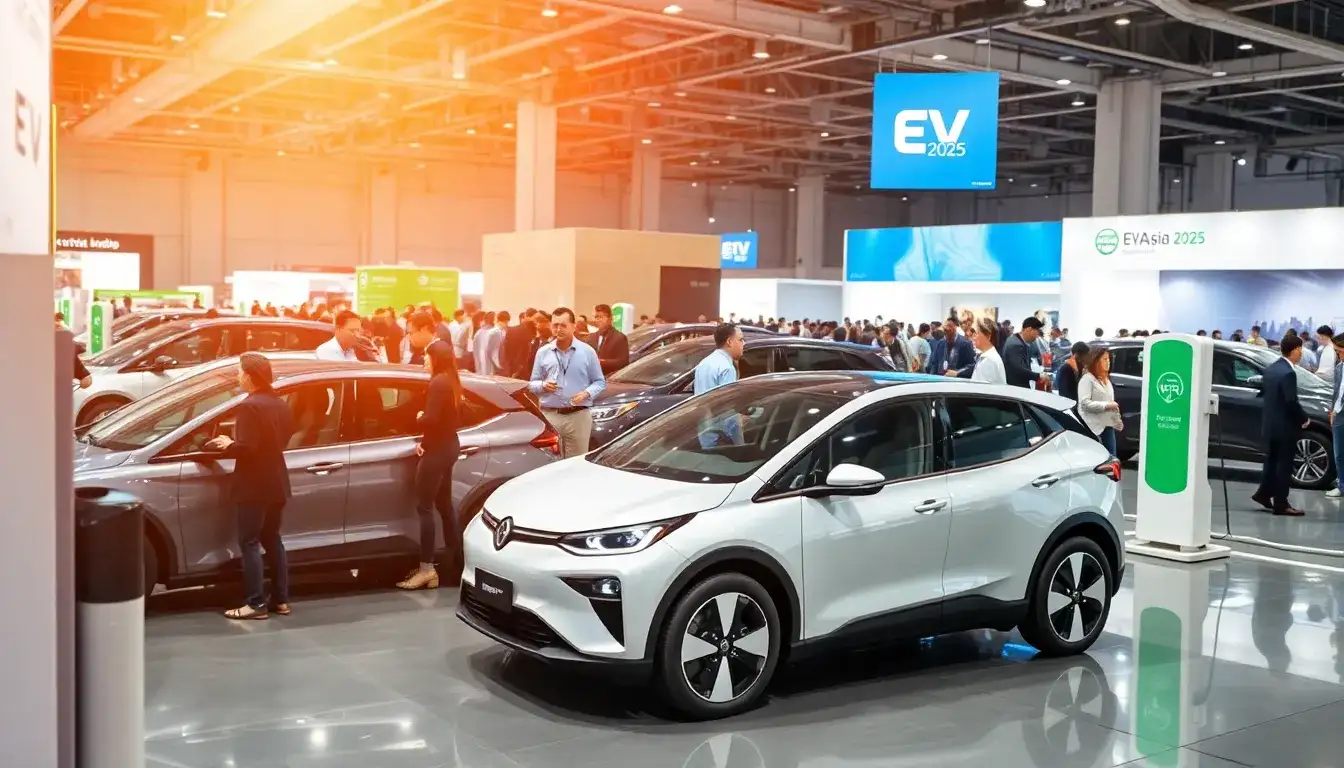
EV Asia 2025: Thailand’s Charging Station Exhibition
The 9th EV Asia 2025 exhibition dedicated to new energy vehicles and charging stations will take place from July 2-4, 2025 at the Queen Sirikit National Convention Center in Bangkok, Thailand. This annual event is organized by Informa Markets and the Electric Vehicle Association of Thailand (EVAT), with Oriental Fortune (Beijing) International Exhibition Co., Ltd. as the general representative for China.
Event Overview
The exhibition aims to provide a platform for global exchanges and market cooperation in the field of new energy vehicles and charging infrastructure. As one of the most influential new energy exhibitions in Southeast Asia, EV Asia 2025 will attract leading electric vehicle manufacturers, battery technology companies, charging infrastructure suppliers, and smart mobility technology firms to showcase the latest breakthroughs in the new energy sector.
With the Thai government actively promoting clean energy transportation, the event will feature cutting-edge electric vehicle technologies and delve into core industry trends, such as smart charging networks, renewable energy integration, hydrogen energy, and the prospects for solid-state batteries.
Highlights of the Exhibition
One of the key highlights of EV Asia 2025 is the concentrated display of smart electric vehicle technologies, including high-performance battery management systems, autonomous driving assistance features, smart cockpit technologies, and vehicle-to-everything (V2X) technologies. Unlike traditional exhibitions, there will be an immersive experience area where attendees can personally drive the latest electric vehicles and experience the transformative changes brought by new energy technologies.
Many automotive brands will also unveil their latest new energy models tailored for the Southeast Asian market, addressing local consumer demands for range, charging speed, and smart driving capabilities.
Charging Infrastructure Development
The development of charging infrastructure is another core topic at EV Asia 2025. In recent years, the Thai government has strongly supported the construction of charging stations through subsidies and tax incentives, attracting domestic and foreign investments in fast-charging stations and smart charging networks. The exhibition will showcase the latest ultra-fast charging technologies, wireless charging systems, and integrated solar storage solutions to enhance the overall charging experience.
Additionally, the application of smart energy management systems will receive significant attention, exploring how V2G technology can enable efficient energy dispatch and improve grid stability. The enhancement of charging infrastructure will be crucial for the widespread adoption of electric vehicles in Thailand, making this exhibition an essential platform for government, businesses, and investors to discuss industry development directions.
Industry Forums and Business Matching
Beyond being a showcase for technologies and products, EV Asia 2025 will also serve as a venue for industry exchanges and policy dialogues. Several high-level forums will be held concurrently, covering topics such as trends in new energy mobility, investment opportunities in the Southeast Asian market, and the integration of renewable energy with the electric vehicle industry. Government officials, industry experts, and corporate executives will gather to discuss the growth prospects of Thailand and surrounding markets. Moreover, business matching sessions will provide companies with precise market expansion opportunities, promoting international cooperation.
Exhibits Overview
1. New Energy Vehicles and Services
- Electric vehicles: electric cars, light electric vehicles (<350kg), electric motorcycles, electric scooters, electric bicycles, electric recreational vehicles, electric golf carts, electric commercial vehicles, electric trucks, electric buses, electric forklifts, and electric transport/storage vehicles.
- Autonomous vehicles: connected and autonomous cars, connected and autonomous commercial vehicles, connected and autonomous trucks, and connected and autonomous buses.
- Vehicle certification services: electric vehicle components, vehicle services, and vehicle certification.
2. Energy and Infrastructure
- Charging stations, solar charging stations, fast charging stations, energy providers, hydrogen energy providers, energy networks, smart grids, and V2G technology.
3. Batteries and Powertrains
- Battery technologies: battery systems, lithium batteries, lead-acid batteries, nickel batteries, battery management systems, and supercapacitors.
- Fuel cell technologies: fuel cell systems and hydrogen tanks.
4. Autonomous Driving and Electronic Technologies
- Driver assistance systems, autonomous driving systems, vehicle monitoring systems, and safety and security services.
5. Smart City and Mobility
- Interface design, interior and lightweight design, urban planning, and transportation design.
6. Mobility Concepts and Services
- Mobility concepts, shared mobility solutions, and financial services.
7. Information Entertainment and Connectivity
- In-car communication, infotainment applications, and automotive comfort technologies.
8. Materials and Engineering
- Battery and powertrain materials, lightweight design engineering, and material testing.
9. Maintenance and Accessories
- Maintenance tools, diagnostic equipment, and parts for electric vehicles.
Market Overview
1. Market Analysis
The new energy electric vehicle market in Thailand is undergoing an unprecedented upgrade and transformation. The government is not only providing policy support but also making significant efforts in infrastructure development and industry chain integration. In addition to tax incentives and subsidies, Thailand is fostering a more self-reliant new energy industry system by attracting foreign investments and encouraging local enterprises to develop core technologies.
2. Government Policies
To stimulate the purchase and use of new energy vehicles, the Thai government has implemented several tax reductions and subsidy policies. Under the latest EV3.5 policy, electric passenger cars priced below 2 million THB can enjoy up to 40% reduction in import duties and a decrease in the consumption tax rate from 8% to 2%.
3. Market Trends
The market for new energy electric vehicles and charging stations in Thailand is experiencing profound changes driven by government, corporate, and societal efforts. The focus on carbon neutrality is prompting Thailand to adjust its transportation energy structure through policy incentives, technology introduction, and infrastructure enhancement.
4. Industry Segmentation
The electric vehicle industry in Thailand is transitioning from a singular automotive market to an integrated ecosystem. As electric vehicles become central to energy networks, smart infrastructure, and digital mobility solutions, various players are entering the market to reshape industry boundaries.
Conclusion
As the new energy electric vehicle and charging station market in Thailand continues to grow steadily, it is poised for innovative developments that will solidify its position in the Southeast Asian green mobility landscape.







